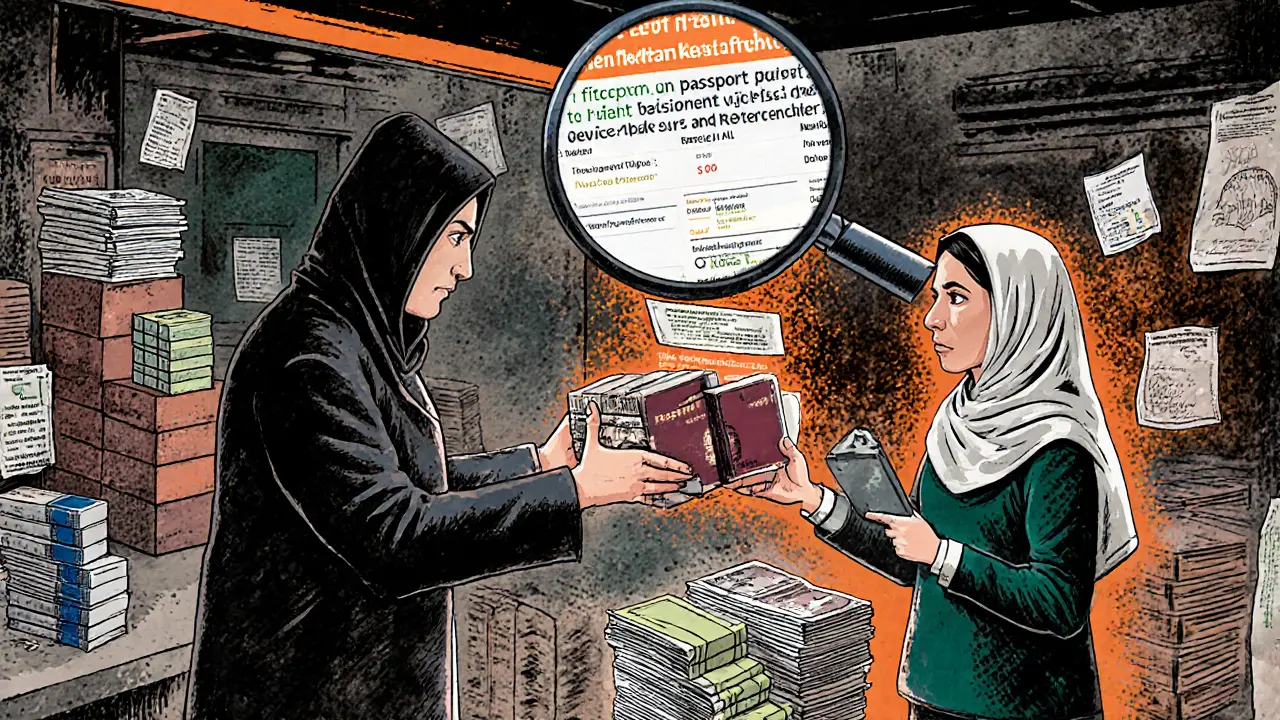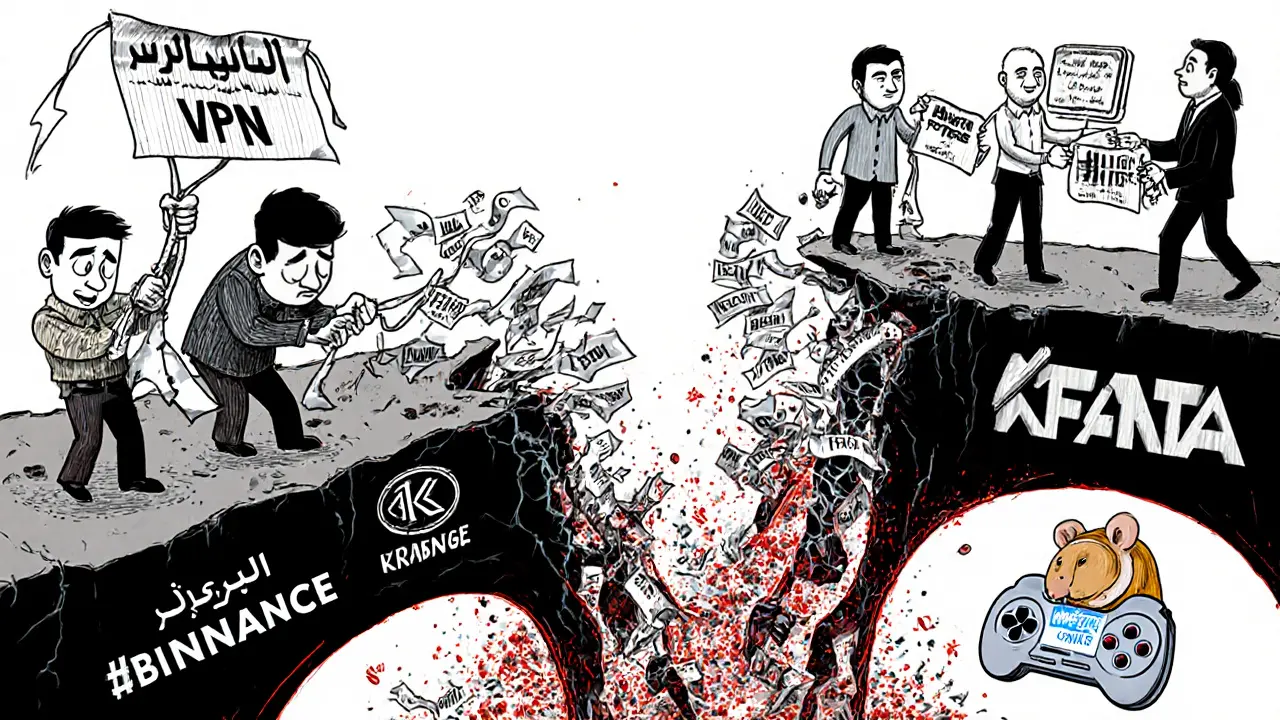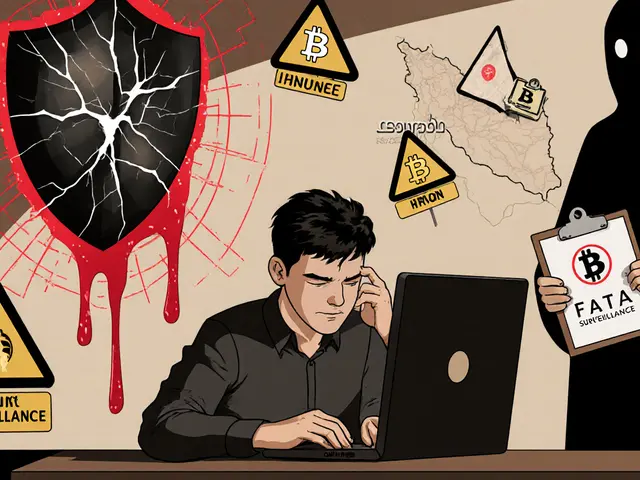Iran VPN Crypto Risk Assessment
Assess Your Detection Risk
Enter your VPN usage patterns to calculate your risk level for being detected by exchanges in Iran.
Risk Factors
Risk Assessment Results
For Iranian crypto traders, using a VPN isn’t a luxury-it’s a necessity. But every time they connect, they’re playing a high-stakes game where a single dropped connection can mean losing access to their life savings. Since early 2025, the risks have skyrocketed. What used to be a simple workaround-hiding an Iranian IP behind a foreign server-is now a dangerous gamble against increasingly smart detection systems.
Why Iranians Rely on VPNs for Crypto
Iran’s government blocks access to most international cryptocurrency exchanges like Binance, Kraken, and Coinbase. At the same time, domestic platforms like Nobitex are under heavy scrutiny. The Central Bank of Iran prohibits banks from processing crypto-related payments, making it nearly impossible to deposit or withdraw fiat currency legally. So traders turn to VPNs to bypass these blocks and reach foreign exchanges where they can trade freely. But it’s not just about access. Many Iranian users prefer international exchanges because they don’t require strict identity verification. Back in 2021, Binance only needed an email to sign up. That changed when the platform tightened its anti-money laundering rules. Now, even with a VPN, traders face layered checks-phone verification, ID uploads, device fingerprinting. Without a way to fake a foreign identity, they’re locked out.The Underground Identity Ecosystem
To get around these new barriers, a hidden industry has grown. Iranian traders now buy complete digital identity packages from underground vendors. These aren’t just simple proxy services-they’re full setups: foreign IBANs, international SIM cards for OTPs, fake residency documents, and even scanned passports from Eastern Europe or Latin America. Some traders spend hundreds of dollars on these packages just to open an account on a single exchange. These services aren’t just for tech-savvy users. According to blockchain analysts, ordinary Iranians-teachers, shopkeepers, engineers-are now using crypto as a hedge against inflation. They need these tools to survive. One trader in Tehran told Reuters he spent months saving up $400 to buy a full identity kit. He used it to open a Kraken account. Two weeks later, his connection dropped during a withdrawal. His IP was exposed. His account was frozen. He lost $12,000 in Bitcoin.How Exchanges Detect Iranian Users (Even With VPNs)
It’s not enough to hide your IP. Modern exchanges use dozens of signals to flag Iranian users:- Device fingerprinting: Your browser, screen size, fonts, and even keyboard layout can reveal your location.
- Transaction timing: Trades made during Tehran business hours (3:30 AM-12:30 PM UTC) raise red flags.
- Withdrawal destinations: If your crypto is sent to a wallet that’s previously interacted with Nobitex, you’re flagged.
- Behavioral patterns: Repeated login attempts from the same device, frequent small deposits, and using the same email across multiple platforms all add up.

The Cost of Free VPNs
Many Iranians use free VPN apps downloaded from unofficial app stores. These aren’t just slow-they’re dangerous. A 2025 investigation found that 68% of free VPNs used in Iran either sold user data to third parties or injected malware into traffic. Some even redirected crypto transactions to wallets controlled by hackers. One trader in Mashhad lost $8,500 after installing a free VPN advertised on Telegram. The app didn’t encrypt his traffic. Instead, it logged his wallet addresses and sent them to a group that drained his funds within hours. He didn’t even realize he’d been hacked until his balance hit zero. Even paid VPNs aren’t safe. If the provider logs connections, your data can be leaked. And if the server gets compromised-like when a popular VPN provider was hacked in March 2025-thousands of Iranian users were exposed in minutes.What Happens When You Get Caught
Getting detected doesn’t just mean losing your crypto. In Iran, the consequences can be far worse. In January 2025, Iran Cyber Police (FATA) froze over one million bank accounts linked to crypto activity. The Central Bank worked with telecom providers to track who was using crypto-related apps. People who used VPNs to access exchanges were flagged for “illegal financial transactions.” Some received summonses. Others were pressured to hand over passwords or face fines. Worse still, domestic exchanges like Nobitex have been accused of cooperating with surveillance. A security breach in May 2025 exposed internal logs showing that Nobitex shared user transaction data with government agencies. Trust in local platforms collapsed. Since then, over 60% of Iranian traders have moved their activity to foreign exchanges-despite the higher risk.Why Volumes Are Plummeting
Crypto inflows to Iran dropped 76% in July 2025 compared to the same month in 2024. That’s not just because of sanctions. It’s because the tools that once worked are failing. The $3.7 billion in crypto flows between January and July 2025 sounds high-but it’s down 11% from last year. The sharpest drop came after April, when detection systems got smarter. Traders who once made daily trades are now sitting on their holdings, afraid to move anything. Some have stopped trading entirely. The rise of Hamster Combat-a mobile game that pays small amounts of crypto for daily tasks-shows how people are adapting. It’s not a solution, but it’s a workaround. No VPN needed. No identity verification. Just a phone and patience. Thousands of Iranians now earn small amounts of crypto this way, avoiding the risks of exchanges altogether.
The Future: More Detection, More Risk
The cat-and-mouse game isn’t ending. Blockchain intelligence firms are expanding their Iranian monitoring programs. New tools can now identify users based on how they type, what time they log in, and even how long they spend on a page before making a trade. Iranian authorities are also stepping up. The Ministry of Energy now tracks electricity usage to spot mining farms. The Central Bank is working with foreign banks to block transfers from crypto-linked accounts. And international exchanges are under pressure from regulators to cut off Iranian users entirely. VPNs won’t disappear. But they’re becoming less reliable. The next wave of tools will likely involve decentralized identity systems, zero-knowledge proofs, and privacy-focused blockchains like Zcash or Monero. But for now, most Iranian traders are stuck with outdated methods-and mounting risks.What Traders Can Do
If you’re an Iranian crypto trader, here’s what actually works right now:- Never use free VPNs. They’re traps. Use only reputable, no-log providers with a history of resisting government requests.
- Use a dedicated device. Don’t trade on your phone or personal laptop. Use a clean, factory-reset machine with no personal data.
- Separate your identity. Use a different email, phone number, and payment method for crypto than you use for daily life.
- Don’t reuse wallets. If you’ve ever traded on Nobitex, never send crypto to that same wallet on a foreign exchange.
- Withdraw slowly. Large, sudden withdrawals trigger alerts. Move funds in small amounts over weeks.
- Keep backups offline. Store your seed phrases on paper, in a safe place. If your account is frozen, you’ll need them to recover funds.
Final Reality Check
There’s no magic fix. Using a VPN to trade crypto in Iran is legal gray zone at best-and increasingly dangerous. The system is designed to catch you. The more you trade, the more you’re tracked. Some traders still succeed. But they’re the exception. Most lose money, accounts, or worse. If you’re doing this to protect your savings, remember: the goal isn’t to outsmart the system. It’s to survive it.Can I use a VPN to trade crypto in Iran without getting caught?
It’s possible, but increasingly difficult. Exchanges now detect Iranian users through device fingerprints, transaction timing, and behavioral patterns-not just IP addresses. Even the best VPNs can fail if your connection drops or if you reuse wallets linked to domestic exchanges like Nobitex. The risk of account freezes and surveillance is very high.
Why are free VPNs so dangerous for Iranian crypto traders?
Many free VPNs in Iran are scams. They don’t encrypt your traffic properly, log your activity, or even steal your wallet addresses and send them to hackers. A 2025 study found 68% of free VPN apps used by Iranian traders contained malware or data-stealing code. Using one is like handing your crypto keys to a stranger.
What happens if my VPN connection drops during a trade?
Your real Iranian IP address is instantly exposed. Most exchanges automatically freeze accounts when they detect a switch from a foreign IP to an Iranian one, especially during active transactions. This is one of the most common ways traders lose access to their funds. Always use a VPN with a kill switch to prevent this.
Is Nobitex safe to use for crypto trading in Iran?
No. Nobitex processes over 87% of Iranian crypto volume, but it has been linked to government surveillance. After a major security breach in May 2025, internal logs revealed the exchange shared user data with Iranian authorities. Many traders have moved away from Nobitex, but its dominance makes it a prime target for tracking.
Why are crypto inflows to Iran dropping so fast?
Crypto inflows dropped 76% in July 2025 compared to July 2024 because detection systems improved dramatically. Blockchain analytics firms now track Iranian transaction patterns with high accuracy. Combined with stricter KYC rules on exchanges and the exposure of domestic platforms like Nobitex, traders are afraid to move funds. Many have stopped trading entirely.
Are there alternatives to using VPNs for crypto in Iran?
Yes. Some traders now use peer-to-peer (P2P) platforms like LocalCryptos or Paxful, where they trade directly with others using cash or gift cards. Others use privacy coins like Monero or Zcash to obscure transaction trails. A growing number are turning to crypto-gaming apps like Hamster Combat to earn small amounts without using exchanges at all.

Louise Watson
VPN? Just don't trade.
Finn McGinty
It is, frankly, a moral outrage that individuals are forced into such precarious digital subterfuge merely to preserve their economic dignity. The systemic oppression of financial autonomy under the guise of regulatory control is not merely authoritarian-it is a violation of human rights as defined by the Universal Declaration of Economic Freedoms.
Alexis Rivera
What’s happening in Iran isn’t just about crypto. It’s about people trying to protect their livelihoods from a system that refuses to let them participate in the global economy. The fact that teachers and shopkeepers are risking everything just to hedge against inflation says everything about how broken the system is. This isn’t a tech problem-it’s a human one.
Eric von Stackelberg
Let me be clear: this entire operation is a Western intelligence operation disguised as financial freedom. The blockchain analytics firms? Funded by the CIA. The bounty programs? Designed to identify dissidents. The "free VPNs" with malware? Planted by Mossad to destabilize Iran’s underground economy. Everything you’ve read here is a psyop to justify regime change. The real enemy isn’t the Iranian government-it’s the global surveillance complex that wants to control every transaction, every wallet, every breath.
Emily Unter King
Device fingerprinting is the silent killer here. The fact that font rendering, screen resolution, and keyboard layout can be used to geolocate a user with 92% accuracy in 2025 is both terrifying and inevitable. We’re entering an era where anonymity is no longer a technical challenge-it’s a sociopolitical liability. The only viable path forward is hardware-level isolation: air-gapped devices, Tails OS, and hardware wallets with no USB connectivity. Anything less is financial suicide.
Michelle Sedita
I think it’s kind of beautiful, in a tragic way, that people are using crypto not for speculation, but for survival. It’s like digital bartering in a world that forgot how to value human dignity. The fact that someone spent $400 on a fake passport just to keep their savings from being erased by inflation… that’s not a hack. That’s a revolution.
John Doe
They’re watching you. Always. Even if you think you’re safe. Even if you use a paid VPN. Even if you wipe your device. They track your typing rhythm. Your mouse movements. The way you scroll. Your coffee breaks. Your sleep schedule. That guy who lost $12k? He didn’t get caught because his IP dropped-he got caught because his heartbeat pattern matched the profile of a "high-risk Iranian trader." They’re building AI that can predict your next trade before you make it. You’re not trading crypto. You’re being traded.
Ryan Inouye
So let me get this straight-people in Iran are using fake passports and stolen identities to bypass sanctions… and you’re calling this "resilience"? This isn’t resistance-it’s criminality. The U.S. doesn’t allow drug dealers to use VPNs to evade DEA tracking, so why should Iran be any different? If you want to trade crypto, move to Canada. Stop trying to hack your way out of consequences.
Rob Ashton
To every Iranian trader reading this: you are not alone. The world sees your courage. The tools you’re using are imperfect, but your will to survive is not. Please, take the advice seriously-dedicated device, offline backups, no reuse of wallets. You’re not just protecting your assets-you’re preserving your future. And if you ever need help navigating secure protocols, I’m here. No judgment. No politics. Just support.
Cydney Proctor
Oh please. "Free VPNs are dangerous"? Newsflash: anyone who uses a free VPN in Iran deserves to lose their money. You’re not a victim-you’re a liability. And the fact that you think Hamster Combat is a "solution" is just pathetic. Crypto isn’t for people who want to earn pennies by tapping their phone. If you can’t afford a real setup, you shouldn’t be playing at all.
Cierra Ivery
Wait-so you’re saying Nobitex shared data with the government… but then you recommend using Monero? That’s like saying "don’t trust the police, but also don’t call 911." And why is everyone acting like this is new? Iran’s been blocking crypto since 2018! This isn’t a crisis-it’s a pattern. Also, why are we ignoring that most of these "traders" are just speculating on inflation? They’re not saving-they’re gambling. And now they want us to feel bad for them?
Stephanie Tolson
There’s a quiet heroism here that no headline captures. People aren’t doing this for profit-they’re doing it because their savings are evaporating faster than their government’s promises. The fact that they’re learning to use hardware wallets, avoid device fingerprints, and separate identities… that’s not tech savvy. That’s survival instinct. And it’s happening in basements, on shared phones, with electricity cuts every few hours. We talk about innovation in Silicon Valley. This? This is innovation born of desperation. And it’s beautiful.
Vipul dhingra
Why do you think Iranians are so dependent on VPNs when they have their own exchange? Nobitex is the best option. The government is not evil it is protecting the economy from western manipulation. You think your western exchanges are honest? They are owned by the same banks that crashed the world in 2008. Your crypto is a scam. The real solution is to use gold and barter. Stop being a tool of the west
Jacque Hustead
I just want to say thank you to everyone sharing their experiences here. It’s easy to judge from afar, but this is real life for people who have no safety net. The advice in the post is spot-on. I’ve shared it with a friend who’s trying to help her cousin in Tehran. Small acts of solidarity matter. Even if it’s just reading and believing their story.
Wendy Pickard
It breaks my heart that people have to choose between their safety and their savings. I don’t know how to fix the system, but I hope someone is listening. The fact that someone spent $400 on a fake passport just to withdraw Bitcoin… that’s not a tech failure. That’s a failure of global justice.
Jeana Albert
Oh my god, this is so dramatic. I just lost my entire portfolio because my VPN dropped and now I’m crying in my car. Can someone please tell me if I can get my money back? I swear I didn’t know Nobitex was bad. I thought it was safe because my cousin uses it. Also, why do you all hate free VPNs? I paid $2 for that app on Telegram and it worked fine until it didn’t. Now I’m scared to even open my laptop.
Diana Smarandache
It is imperative to recognize that the current technological landscape has been weaponized against sovereign economic autonomy. The deployment of behavioral analytics, blockchain tracing, and identity correlation systems constitutes a form of digital colonialism. The international financial infrastructure is no longer neutral-it is an instrument of geopolitical coercion. To continue operating within this paradigm is to accept subjugation under the guise of financial inclusion. The only ethical response is to abandon centralized platforms entirely and construct decentralized, peer-to-peer networks that operate beyond the reach of state and corporate surveillance.